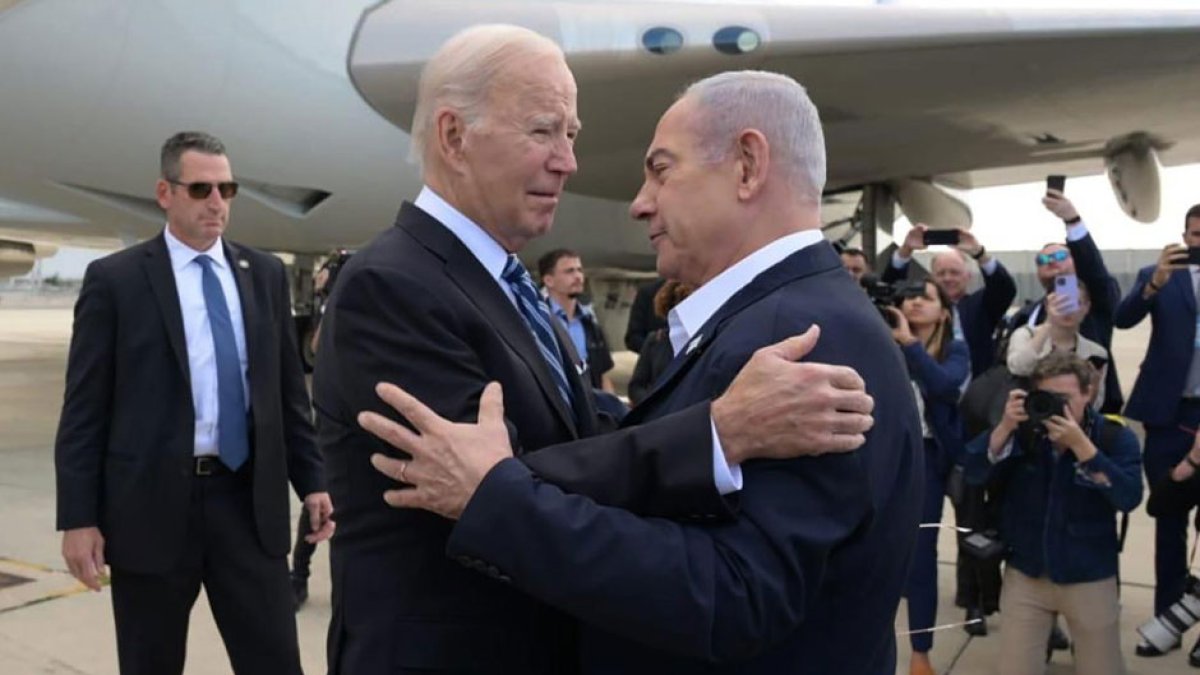Biden arrives in Israel at the most critical moment of the war against Hamas
The president's arrival was marked by the explosion at the Al Ahli hospital in Gaza, the call for "a day of unprecedented anger" by Hezbollah and the cancellation of meetings with the leaders of Arab countries.

EFE/EPA/GPO/Avi Ohion HANDOUT HANDOUT EDITORIAL USE ONLY/N
Joe Biden landed in Tel Aviv at the most critical moment of the war between Israel and Hamas. The president was welcomed at the steps of Air Force One by Benjamin Netanyahu. His visit also coincides with a wave of violent protests throughout the Arab world and the call by Hezbollah for "a day of unprecedented anger" after the impact of a missile fired by terrorists into Al-Ahli Hospital in Gaza that caused numerous deaths. Protests continue to pop up throughout the Western world. In his first words after setting foot on Israeli soil, Biden backed the findings of Israel's investigations into the rocket that hit the hospital: "Based on what I've seen, it appears as though it was done by the other team, not you." In addition, Biden noted that 31 Americans have been killed as a result of Hamas' actions.
Biden reaffirms U.S. support for Israel: 'I wanted to come here personally and make it clear'
After landing, Biden highlighted the main objective of the trip, which is none other than to reiterate U.S. support for Israel and insist on the right of the Jewish state to defend itself:
The president again condemned the Oct. 7 Hamas massacre that led to the current war: "It is beyond my comprehension. They have committed evil, atrocities that make ISIS look somewhat more rational." However, the commander-in-chief was keen to point out that "we have to also bear in mind that Hamas does not represent all the Palestinian people and has brought them only suffering."
Humanitarian assistance for Gaza
The president also announced that he agreed with Israel on the arrival of humanitarian aid to Gaza. He maintained that there will be inspections to ensure that these resources reach civilians and not terrorists. The package would include $100 million in U.S. humanitarian aid funds for both Gaza and the West Bank.
"Today I asked the Israeli Cabinet to agree to the delivery of life saving humanitarian assistance to civilians in Gaza based on the understanding that there will be inspections and that the aid should go to civilians, not Hamas," the president said.
"Let me be clear, if Hamas diverts or steals the assistance, it will have demonstrated once again that they have no concern for the welfare of the Palestinian people, and it will end," the Democrat added.
Biden's decision contrasts with the Israeli Cabinet's decision not to allow humanitarian aid into Gaza from Israel. The Israeli government is demanding the release of the hostages held by the terrorists before it delivers aid, as reported by The Times of Israel.
The number of Americans killed by Hamas rises to 31
The president also reported that the number of American citizens killed as a result of Hamas' actions has risen to 31. He was intent to use the word "slaughtered" to define the atrocities committed by the terrorist group.
Biden's visit amidst rising tensions
The objective of the president's visit was to express U.S. support for Israel and deter other nations and terrorist groups in the region from getting directly involved in and escalating the conflict. However, Biden's trip started amidst an even more hostile climate, with the situation in many Arab countries seemingly teetering towards crisis. And yet, Biden traveled with high expectations of reducing the tension. As a more promising sign, before Biden's visit, Secretary of State Antony Blinken announced an agreement with Israel to open a humanitarian corridor, which could include safe zones for civilians.
Terrorist alert and protests in the Western world
Following Tuesday night's events, threats of violence and fear of attacks spread throughout the entire Western world, which has rushed to implement anti-terrorism measures due to fear of organized or isolated attacks.
In addition to violent protests in Jordan, Lebanon, Iran, Iraq and Turkey in front of the U.S. and Israeli Embassies, Hezbollah and Iran have called for increased intensity of protests and violence. The Lebanese terrorist group called for a "day of unprecedented anger" to coincide with Biden's presence in Israel. In addition, the president's meeting with authorities from the Arab countries in the region was canceled after the hospital explosion.
Anti-Israel protests at the White House while Biden traveled
The protests have also reached Washington, where hundreds of protesters gathered throughout the day and night in front of the White House, waving Palestinian flags and even clashing with police to try to pass the barriers erected by officers. Western countries are actively strengthening anti-terrorism measures and increasing alerts.
Blinken speaks with the president of the Palestinian Authority
The State Department reported that Secretary Blinken spoke with Palestinian Authority President Mahmoud Abbas to extend condolences for the loss of civilian lives from the explosion at Al-Ahli Hospital in Gaza City. "The Secretary expressed continuing U.S. support for the Palestinian people, stressing that Hamas terrorists do not represent Palestinians or their legitimate aspirations for self-determination and equal measures of dignity, freedom, security, and justice," said spokesman Matthew Miller.

























